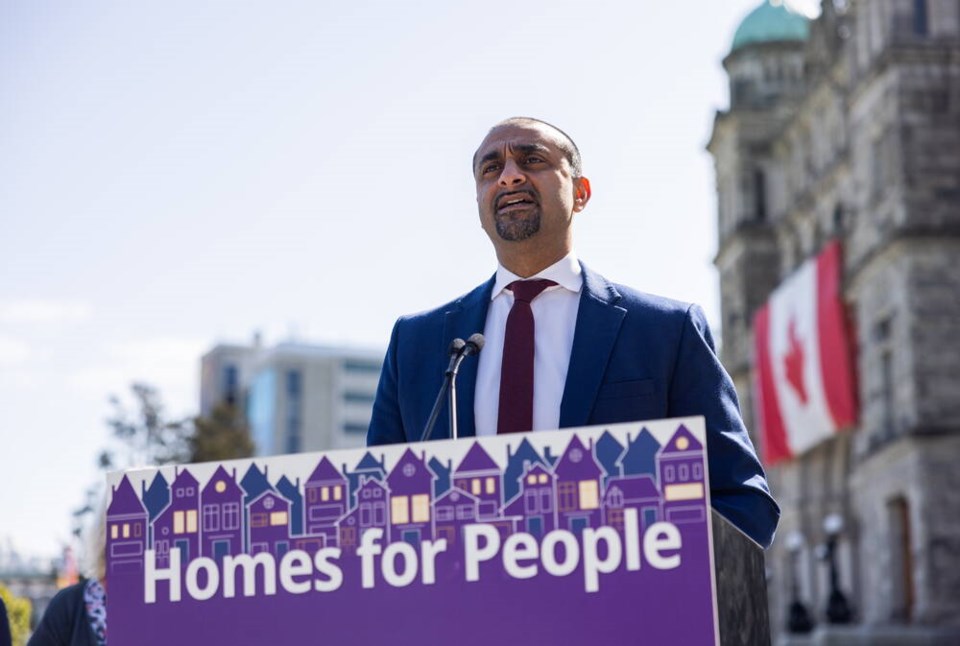B.C.’s housing minister says he’s fed up with squabbling municipal councils, and will bring in changes to provincial oversight of dysfunctional local governments before voters go to the polls next in 2026.
Ravi Kahlon said he’s willing to listen on potential solutions, but will not go as far as to dismiss mayors and councillors deadlocked in petty squabbles that overwhelm the business of local government, as is occurring in communities like Kamloops.
“We've been hearing from many mayors, and councils and [Union of BC Municipalities] as well, on a better path forward, something that puts better, clear rules in place for local governments,” Kahlon said in an interview.
“And the biggest challenge we hear is, what happens when there's rules and people continuously break those rules knowingly?”
Kahlon’s willingness to move on the issue was first reported by B.C’s. ChartMaster General Justin McElroy over at CBC, who has the unenviable task of chronicling municipal dysfunction.
Mostly, it occurs in the form of mayors who can’t work with some or all of their municipal councillors.
That leads to turmoil, such as in the District of Sechelt, where an outside advisor recommended the mayor apologize to council and senior staff for contributing to dysfunction in the organization. Or, major turnover in staff in Lions Bay, amid a culture of silence. Or, the debate in Sayward about whether the village should even continue to exist after five mayors in five years. Or, months of infighting in Harrison Hot Springs culminating with the mayor offering a $5,000 reward to find the so-called mole writing critical anonymous letters about him in the community.
But the worst, by far, has been the City of Kamloops, where several years of complaints, allegations, mudslinging, legal threats and code of conduct investigations have occurred between the mayor and council members. At one point, the entire council asked Mayor Reid Hamer-Jackson to resign. Most recently, council produced a 433-page report outlining multiple sanctions and 30 code of conduct complaints.
“It’s clear that this kind of dysfunction cannot continue as it undermines public trust and the democratic process,” Kahlon has said publicly about the situation in Kamloops.
But what can be done? Currently, the province can provide outside advisors and recommendations when asked for help by municipal leaders. It does not have the legislative authority to intervene directly to fire councillors or mayors.
Kahlon said he’s not envisioning going that far, because the Union of BC Municipalities and others have not asked for it.
“We haven't heard that yet from any local government, and I suspect it's unlikely that we will,” said Kahlon.
“And so I don't want to get too much into a hypothetical situation, because that hasn't been the scope of what UBCM has suggested or other local governments. I mean, even Kamloops, with all their challenges, haven't even suggested that.
“And so I'm not going to go down that route till we see what comes back.”
Instead, the province intends to consult this summer to try and get something on the books before the Oct. 17, 2026, municipal elections.
“My commitment is that we have something in place by the next round of elections, so that any new mayor or councillor that comes in understands their responsibilities, not only to each other at the table, but also to their staff and to the public,” said Kahlon.
Municipalities are creatures of the provincial government.
A UBCM report in 2024, spurred on by what it said was a rise in irresponsible conduct by elected officials, has raised possibilities such as a municipal integrity commissioner, who could give local governments fair and unbiased advice on conduct violations, conflict of interest and bullying. It has also suggested considering mandatory education for elected officials and mandatory codes of conduct.
“None of the current sanctions available to local governments in British Columbia are established through legislation,” read the report. “As a result, the range of sanctions varies considerably from one local government to the next. In many cases, councils and boards have struggled with applying the full range of sanctions available.”
UBCM laid out several possible changes for the province to consider, and gathered feedback from members last fall. Kahlon said he’ll also cast a net out for suggestions too — albeit, reluctantly.
“My hope was always not to go down this route,” he said. “I’ve been asked this for a long time to consider, but given that we have so many communities going through challenges, and Kamloops is just the poster child for it, we have to find a better way forward.”
Rob Shaw has spent more than 17 years covering B.C. politics, now reporting for CHEK News and writing for The Orca/BIV. He is the co-author of the national bestselling book A Matter of Confidence, host of the weekly podcast Political Capital, and a regular guest on CBC Radio.
[email protected]
🚨New newsletter alert! Stay ahead of the curve in B.C. politics. Get expert political analysis delivered straight to your inbox, plus inside scoops and other stories from across the province. Sign up here for the Capital & Coast newsletter



